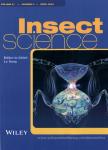Adult size and tinning of reproduction in five species of Asobara parasitoid wasps
作者机构:Plant Protection Research DepartmentHormozgan Agricultural and Natural Resources Research and Education CenterAgricultural Research Education and Extension Organization(AREEO)Bandar AbbasIran Faculty of Earth and Life SciencesInstitute of Ecological ScienceAnimal EcologyVrije University AmsterdamAmsterdamthe Netherlands Institute for Biodiversity and Ecosystem dynamicsUniversity of AmsterdamAmsterdamthe Netherlands
出 版 物:《Insect Science》 (昆虫科学(英文版))
年 卷 期:2020年第27卷第6期
页 面:1334-1345页
核心收录:
学科分类:0710[理学-生物学] 07[理学] 09[农学]
基 金:AREO Agricultural Research and Education Organization Iran
主 题:hymenopterous parasitoids lipid reserve ovigeny index equivalent reproduction strategy resource allocation
摘 要:The majority o f adult parasitoid wasps are unable to synthesize lipids and therefore face a trade-off between the investment of lipids in eggs or in the maintenance of *** has been shown that resource allocation should depend on body size in *** that smaller females have shorter expected life times,they should concentrate their reproductive effort into early *** test this prediction,we investigated the relationship between body size and the timing of egg production in *** measured body size,lipid reserves,and reproductive investment(number of eggs,ovigeny index equivalent[OIE]and egg size)at eclosion in five species of Asobara(Hymenoptera:Braconidae)originating from different geographic and climatic *** results show significant interspecific variation in all these traits.A diagnostic test for phylogenetic independence revealed that closely related species did not resemble each other more closely than expected by chance for all traits *** reserves scaled positively with body size both between and within *** agreement with theory,01 correlated negatively with body size both between and within *** egg area at eclosion correlated negatively with lipid reserves both between and within *** indicates the existence of a trade-off between allocation of lipids to current reproduction and survival/future *** the exception of the most extreme pro-ovigenic species,*** im ilis,we found that proovigeny was compensated for by small egg *** results indicate the role of habitats in shaping interspecific variation in resource allocation strategies.



